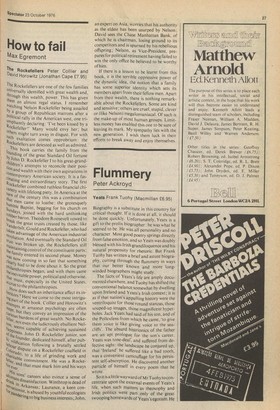How to fail
Max Egremont The Rockefellers Peter Collier and David Horowitz (Jonathan Cape £7.95) l} Rockefellers are one of the few families universally identified with great wealth and. through this wealth, power. This has given them an almost regal status. I remember watching Nelson Rockefeller being assailed bY a group of Republican matrons after a Political rally in the American west, one triamPhantly declaring: 'I've been kissed by a Rockefeller!' Many would envy her; but others might turn away in disgust. For with !such exaltation comes opprobrium : the tockefellers are detested as well as admired. This book carries the family from the Linding of the great Standard Oil fortune 'Y John D. Rockefeller I to his great-grandchildren's attempts to reconcile their position and wealth with their own aspirations in Co atemporary American society. It is a fascinating and extraordinary story. The first Rockefeller combined ruthless financial chicanerY with lifelong piety. In America at the turn of the century this was a combination t,hat men came to loathe: the grotesquely smble Baptist, begging for his church on tindays, joined with the hard unthinking ris)3bber baron. Theodore Roosevelt vowed to jeak the great trusts created by those. like janderbilt, Gould and Rockefeller, who had rev advantage of the American industrial tolution. And eventually the Standard Oil ,srust was broken up, the Rockefellers still t"lhaintaining control of the constituent parts; w: family entered its second phase. Money 0,:s now coming in so fast that something `TlY had to be done about it. So the great anthropies began, and with them came ;inevitable power, political and otherwise. „at must, especially in the United States. "`-crue to the philanthropists.
iilow does such an inheritance affect its in
? Here we come to the most intrigu:lig Part of the book. Collier and Horowitz 's ineeniPts at amateur psychology are often e„..D.t, but they convey an impression of the f.v:,r,tous burdens of great wealth. No Rocke solnler, not even the ludicrously ebullient Nelh, seems capable of achieving sustained optpiness. John D. Rockefeller junior, son vi lie ne founder, dedicated himself, after pubiab n,_lation following a brutally settled ;Jnr ur dispute on a Rockefeller coalfield in cha,..ad 0. to a life of grinding work and feller commitment. He was a Rocke fo ' rever. and that must Mark him and his ways His s ,
cms careers also evince a sense of Itirl'kdte dissatisfaction. Winthrop is dead of
servacin Arkansas; Laurance, a keen con10r pand1°nist, is abused by youthful ecologists •
an expert on Asia, worries that his authority as the eldest has been usurped by Nelson; David sees the Chase Manhattan Bank, of which he is chairman, losing ground to its competitors and is spurned by his rebellious offspring; Nelson, as Vice-President, prepares for political retirement having failed to win the only office he believed to be worthy of him.
If there is a lesson to be learnt from this book, it is the terrible oppressive power of the dynastic idea, the notion that a family has some superior identity which sets its members apart from their fellow men. Apart from their wealth, there is nothing remarkable about the Rockefellers. Some are kind and sensitive; others are cruel, stupid, clever or (like Nelson) megalomaniacal. Of such is the make-up of most human groups. Limitless money has enabled this one to be sure of leaving its mark. My sympathy lies with the new generation. I wish them luck in their efforts to break away and enjoy themselves.










































 Previous page
Previous page